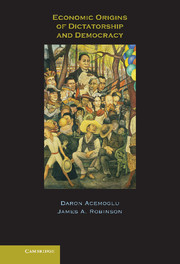Book contents
- Frontmatter
- Contents
- Preface
- PART ONE QUESTIONS AND ANSWERS
- 1 Paths of Political Development
- 2 Our Argument
- 3 What Do We Know about Democracy?
- PART TWO MODELING POLITICS
- PART THREE THE CREATION AND CONSOLIDATION OF DEMOCRACY
- PART FOUR PUTTING THE MODELS TO WORK
- PART FIVE CONCLUSIONS AND THE FUTURE OF DEMOCRACY
- PART SIX APPENDIX
- Bibliography
- Index
2 - Our Argument
Published online by Cambridge University Press: 05 September 2012
- Frontmatter
- Contents
- Preface
- PART ONE QUESTIONS AND ANSWERS
- 1 Paths of Political Development
- 2 Our Argument
- 3 What Do We Know about Democracy?
- PART TWO MODELING POLITICS
- PART THREE THE CREATION AND CONSOLIDATION OF DEMOCRACY
- PART FOUR PUTTING THE MODELS TO WORK
- PART FIVE CONCLUSIONS AND THE FUTURE OF DEMOCRACY
- PART SIX APPENDIX
- Bibliography
- Index
Summary
Why did Britain, Argentina, Singapore, and South Africa follow different political paths? More generally, why are some countries democratic whereas others are ruled by dictatorships or other nondemocratic regimes? Why do many nondemocracies transition into democracy? What determines when and how this transition takes place? And, relatedly, why do some democracies, once created, become consolidated and endure whereas others, like many of those in Latin America, fall prey to coups and revert back to dictatorship?
These are central questions for political science, political economy, and social science more generally, but there are neither widely shared answers nor an accepted framework to tackle them. The aims of this book are to develop a framework for analyzing these questions, provide some tentative answers, and outline future areas for research. As part of our investigation, we first provide an analysis of the role of various political institutions in shaping policies and social choices, emphasizing how politics differs in democratic and nondemocratic regimes. To do so, we model the attitudes of various individuals and groups toward different policies and, therefore, toward the political institutions leading to these policies.
To facilitate the initial exposition of our ideas, it is useful to conceive of society as consisting of two groups – the elites and the citizens – in which the latter are more numerous. Our framework emphasizes that social choices are inherently conflictual.
- Type
- Chapter
- Information
- Economic Origins of Dictatorship and Democracy , pp. 15 - 47Publisher: Cambridge University PressPrint publication year: 2005



